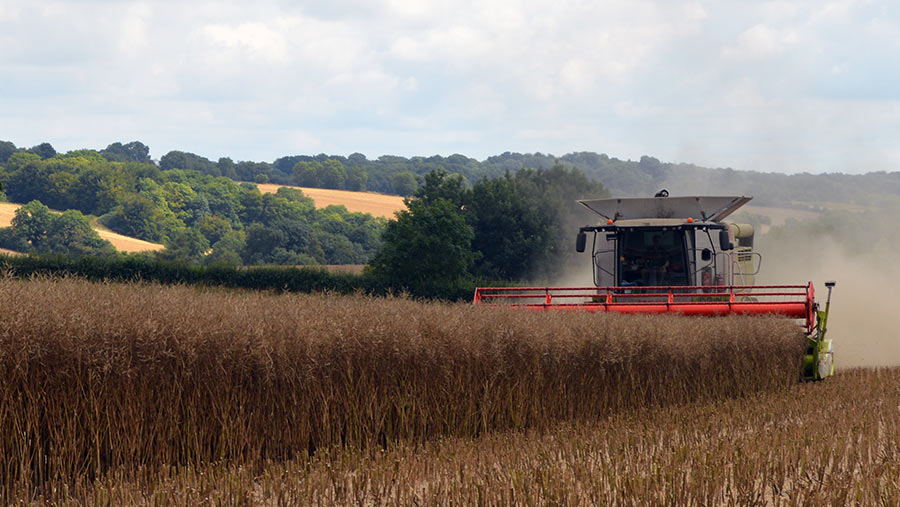Video: Wiltshire wheat fears as oilseed rape harvest rolls on
 © Hayley Parrott/RBI
© Hayley Parrott/RBI The quality of winter wheat is causing some worries for West Country grower David Butler, as harvest reaches the halfway point on his Wiltshire mixed farm.
Having rubbed out some ears of the bread-making variety Crusoe, which is considered to be the farm’s most important wheat crop, Mr Butler says shrivelled grains look to be a potential issue once combines begin to cut the crop in the coming weeks.
“I have been quite concerned at the levels of ear disease in the wheat, so I am fearful for the yields and quality. I suspect the wheat will continue the trend of underwhelming yields – there appears to be quite a few pinched grains.”
See also: Wheat combining gathers pace in Cambridgeshire
Mr Butler is based in the village of Wootton Rivers, just south of Marlborough, farming about 870ha of combinable crops alongside a herd of 280 dairy cows in partnership with his parents.
Harvesting of the farm’s 242ha of oilseed rape is now nearing completion, with yields ranging from 2.5t/ha to 3.7t/ha, with moisture levels good at 8-10%.
The farm has increased the amount of oilseed rape grown in recent years on the back of pest damage seen elsewhere in the UK, as the Wiltshire area tends not to suffer as badly from flea beetle and pollen beetle attack.
“Yields have been underwhelming and quite variable. Overall it is a slightly disappointing picture on the yields, but on the plus side we have had lower costs in terms of the harvesting operation.
“I think there are lots of reasons to be positive – the weather has been very co-operative this year, so we have had a fairly good run without many stop periods.”
Winter barley
Mr Butler says the winter barley’s performance is similar to that of the oilseed rape, with varied yields but overall bushel weights have been respectable.
“The feed variety Cassia yielding 2.7-2.8t/acre [6.7-7.2t/ha] but the bushel weight was in the high 60s [kg/hl].
“I don’t know how we achieved that this year when a lot of people are reporting low bushel weights. Maybe we had more favourable weather at different times in the growing season.”

